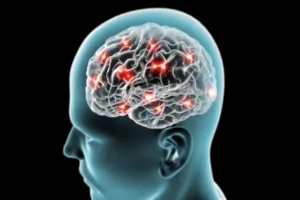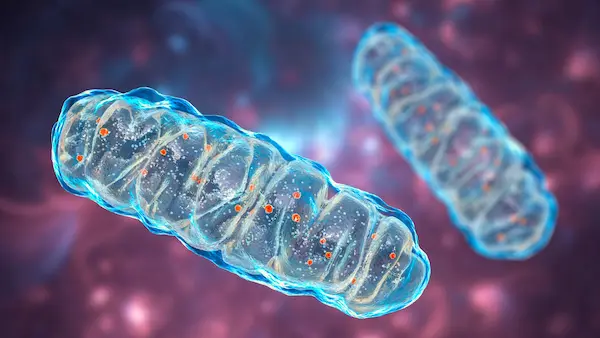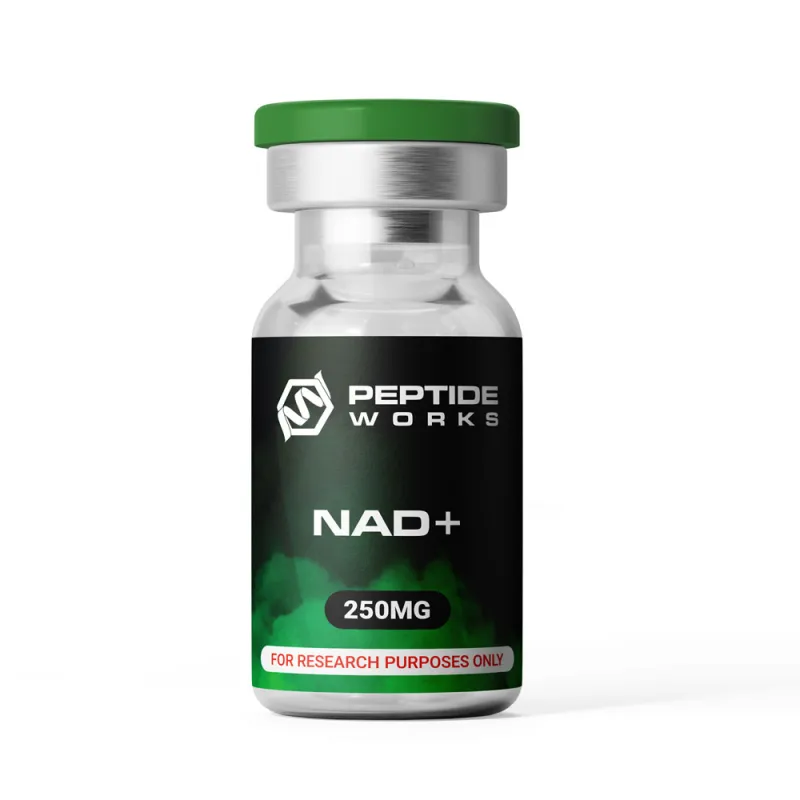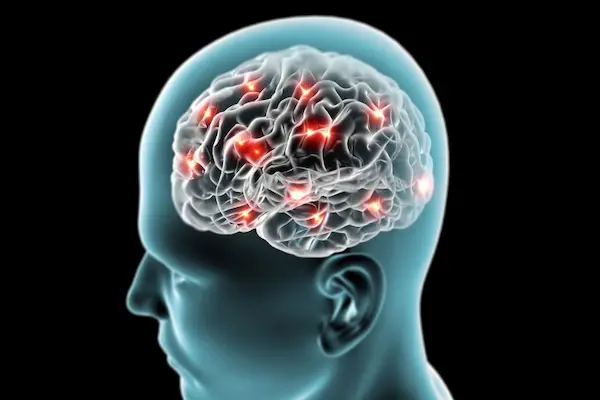
PROMO!
First order? Get 10% OFF with this code: 1storder
Written by

NAD Therapy is gaining attention in research for its possible role in brain health. NAD+ (nicotinamide adenine dinucleotide) is a natural coenzyme found in every cell. It helps the body make energy and repair itself. Because the brain uses so much energy, scientists are studying whether boosting NAD+ could support memory, focus, and mental sharpness.
Researchers are also looking at other peptides, like Semax and P21, for their links to learning and brain protection. These studies are shaping how experts think about future options for cognitive performance research.
Understanding cognitive performance also means asking how NAD+ directly influences clarity, focus, and overall mental sharpness.
Explore NAD+ from Peptide Works, central to NAD therapy research on cellular energy, DNA repair, and cognitive performance.

NAD+ plays a key role in how the brain makes and uses energy. Supporting mitochondria helps neurons stay efficient and reduces cell stress. This steady energy flow is linked to clearer thinking and stronger focus during mental tasks.
Studies also show that NAD+ supports memory by helping brain cells form and strengthen connections, a process known as synaptic plasticity. These findings highlight why NAD Therapy is being studied in research on learning, focus, and overall cognitive performance.
Because synaptic connections are at the heart of learning and memory, researchers also study how changes in these pathways shape brain health.
Synaptic plasticity is how the brain changes the strength of its connections between nerve cells. When certain pathways are used often, they grow stronger. When they are not used, they weaken. This process is what makes memory, learning, and new skills possible.
In current research, NAD Therapy is being studied for its role in supporting synaptic plasticity. By helping NAD+ protect neurons and reduce stress in brain cells, it may keep connections more flexible. This could lead to sharper focus and faster learning. Cognitive peptides like Semax and P21 are also being explored for their links to learning and memory, which adds another layer of interest to cognitive performance research.
Since strong connections depend on a steady energy supply, attention has also turned to the role of mitochondria in supporting cognitive resilience.
Discover P21 from Peptide Works, a peptide studied in Alzheimer’s models for restoring synaptic health and supporting neurogenesis.

Mitochondria are the power plants in brain cells. They produce ATP, the energy neurons need to fire reliably. When mitochondria weaken, energy drops, and thinking slows. Keeping them healthy supports clearer thinking and better memory.
Research into Semax shows it boosts brain-derived neurotrophic factor (BDNF) and activates its receptor TrkB in the hippocampus, key steps for learning and synaptic health.
The P21 peptide, studied in Alzheimer’s models, has been shown to restore synaptic function, enhance neurogenesis, and reduce markers like beta-amyloid and tau that damage cognitive performance.
While mitochondria supply energy, another challenge for long-term brain clarity comes from oxidative stress, which can gradually damage neurons.
Check out Semax from Peptide Works, a peptide researched for boosting BDNF, supporting memory, and offering neuroprotective benefits.
Oxidative stress happens when unstable molecules, called reactive oxygen species (ROS), build up in the brain. Because the brain uses so much energy, it is very sensitive to this imbalance. Too much ROS can harm DNA, proteins, and fats in neurons. Over time, this damage may slow thinking, reduce memory strength, and raise the risk of age-related decline.
NAD Therapy is being studied for how it may protect against this stress. Supporting NAD+ activity helps repair DNA, balance cell defenses, and keep neurons healthier. This support may improve long-term brain clarity and overall cognitive performance.
Protecting against oxidative damage also depends on the brain’s ability to repair its own DNA, a process that keeps neurons functioning over time.

Neurons are exposed to daily stress that can break strands of DNA. If these breaks are not fixed, cells lose function, and memory may fade faster. The brain relies on repair systems, such as PARP enzymes, to keep its genetic code stable and prevent errors.
NAD Therapy is being studied for its role in fueling these repair systems. Supplying NAD+ to enzymes that fix DNA may help neurons recover from oxidative damage and stay resilient. Protecting DNA in this way supports long-term clarity and may lower risks linked to age-related cognitive decline.
Among these repair systems, PARP enzymes stand out as a critical line of defense, but they also need balance to protect brain cells effectively.
PARP enzymes, especially PARP-1, help neurons repair DNA damage caused by daily stress. They depend on NAD+ to keep brain cells stable and functioning. But when PARP-1 becomes overactive, it can drain NAD+ and ATP, leading to a form of cell death called parthanatos, which harms memory and focus.
NAD Therapy research is exploring how it may support balanced PARP activity. By providing NAD+ for repair while preventing overactivation, this approach could help neurons stay resilient. Many studies are now focusing on how NAD Therapy works with DNA repair pathways to strengthen overall neuron protection.
All of these findings highlight how NAD Therapy and related compounds are being studied for their potential role in brain health, shaping the outlook for future research.
Research on NAD Therapy is expanding, with growing evidence of its role in energy production, neuron protection, and DNA repair. Early findings also suggest that peptides such as Semax and P21 may add further value in learning and memory studies. Together, these insights point to new opportunities for advancing cognitive performance research.
Together, these insights point to promising new directions in cognitive performance research. For access to high-quality research peptides, scientists and laboratories worldwide rely on Peptide Works, a trusted retailer with worldwide shipping.
All peptides and compounds mentioned are strictly for research purposes only and not for human use.
[1] Zhao Y, Zhang J, Zheng Y, Zhang Y, et al. NAD+ improves cognitive function and reduces neuroinflammation by ameliorating mitochondrial damage and decreasing ROS production in chronic cerebral hypoperfusion models through Sirt1/PGC-1α pathway. J Neuroinflammation. 2021 Sep 16;18(1):207.
[2] Lautrup S, Sinclair DA, Mattson MP, Fang EF. NAD+ in Brain Aging and Neurodegenerative Disorders. Cell Metab. 2019 Oct 1;30(4):630-655.
[3] Campbell JM. Supplementation with NAD+ and Its Precursors to Prevent Cognitive Decline across Disease Contexts. Nutrients. 2022 Aug 7;14(15):3231.
[4] Dolotov OV, Karpenko EA, Seredenina TS, Inozemtseva LS, et al. Semax, an analogue of adrenocorticotropin (4-10), binds specifically and increases levels of brain-derived neurotrophic factor protein in rat basal forebrain. J Neurochem. 2006 Apr;97 Suppl 1:82-6.
[5] Zhao L, Ma QL, Calon F, Harris-White ME, et al. Role of p21-activated kinase pathway defects in the cognitive deficits of Alzheimer disease. Nat Neurosci. 2006 Feb;9(2):234-42.
ALL CONTENT AND PRODUCT INFORMATION AVAILABLE ON THIS WEBSITE IS FOR EDUCATIONAL PURPOSES ONLY.
DISCLAIMER: These products are intended solely as a research chemical only. This classification allows for their use only for research development and laboratory studies. The information available on our Peptide Works website: https://peptide-works.com/ is provided for educational purposes only. These products are not for human or animal use or consumption in any manner. Handling of these products should be limited to suitably qualified professionals. They are not to be classified as a drug, food, cosmetic, or medicinal product and must not be mislabelled or used as such.
Peptide Works
Related Articles

What are the Best Cognitive Peptides?
Cognitive peptides are short chains of amino acids that researchers are exploring for their potential effects on brain function. They

Achieving increased skin pigmentation without prolonged sun exposure has been demonstrated with Melanotan peptides in research. Two commonly studied options,

Can PTD-DBM Hair Growth Peptide Stop Balding?
Hair thinning and balding affect millions worldwide, often leading to frustration and limited options. This challenge has driven researchers to